Selecting the right filter bag material is crucial for achieving effective filtration, as it directly impacts performance, durability, and the ability to meet specific application needs. However, with a wide range of materials available, users often face challenges in determining the best option for their unique requirements, such as compatibility with different contaminants, operating conditions, and cost considerations. This comprehensive guide is designed to simplify the decision-making process, providing you with the insights and knowledge needed to choose the ideal filter bag material with confidence.
Table of Contents
ToggleWhat Are Filter Bags and Why Does Material Matter?
Filter bags are essential components in filtration systems, designed to capture and remove solid particles from liquids or gases as they pass through. These bags act as a barrier, trapping contaminants while allowing the desired fluid or air to flow through, ensuring cleaner outputs and protecting downstream equipment. They are widely used in industries such as chemical processing, food and beverage, pharmaceuticals, and environmental management, where maintaining purity and efficiency is critical.
The material of a filter bag plays a pivotal role in its performance, directly influencing filtration efficiency, durability, and compatibility with various applications. Different materials, such as polyester, polypropylene, nylon, or PTFE, offer unique properties that cater to specific needs. For instance, some materials provide high resistance to chemicals, making them suitable for corrosive environments, while others excel in handling high temperatures or fine particle filtration. The choice of material also affects the bag’s lifespan, as certain fabrics are more robust and resistant to wear and tear. Selecting the right material ensures optimal filtration performance, reduces maintenance costs, and enhances the overall reliability of the system.
Factors to Choose the Best Filter Bag Material for Industrial Use
Selecting the right filter bag material is crucial for ensuring effective filtration and long-term system performance. Several key factors must be considered to make an informed choice:
- Type of Contaminants: The nature of the contaminants being filtered plays a significant role in determining the appropriate material for filtration. For example, sediment and solid particles may require a durable material with fine filtration capabilities, while chemicals or oils might necessitate materials with high chemical resistance or oil-absorbing properties. Understanding the specific contaminants ensures the filter bag can effectively capture impurities without degrading.
- Operating Conditions: The environmental conditions in which the filter bag will operate are equally important. Factors such as temperature, pressure, and flow rate can impact the material’s performance and durability. High-temperature applications may require heat-resistant materials, such as PTFE, while high-pressure systems demand robust fabrics that can withstand mechanical stress without tearing or losing efficiency.
- Industry Requirements: Different industries have unique standards and regulations that influence the selection of materials. For instance, food-grade and pharmaceutical applications require materials that comply with strict hygiene and safety standards, while industrial settings may prioritize chemical resistance or durability. Ensuring the material meets industry-specific requirements is essential for compliance and optimal performance.
- Cost vs. Performance: Balancing budget constraints with filtration efficiency is a critical consideration. While high-performance materials may offer superior durability and effectiveness, they often come at a higher cost. Evaluating the long-term benefits, such as reduced maintenance and extended lifespan, can help justify the investment in premium materials when necessary.
By carefully assessing these factors, you can select a filter bag material that aligns with your specific application needs, ensuring reliable and efficient filtration while optimizing costs.
Overview of Common Filter Bag Materials
1. Polypropylene Filter Bags
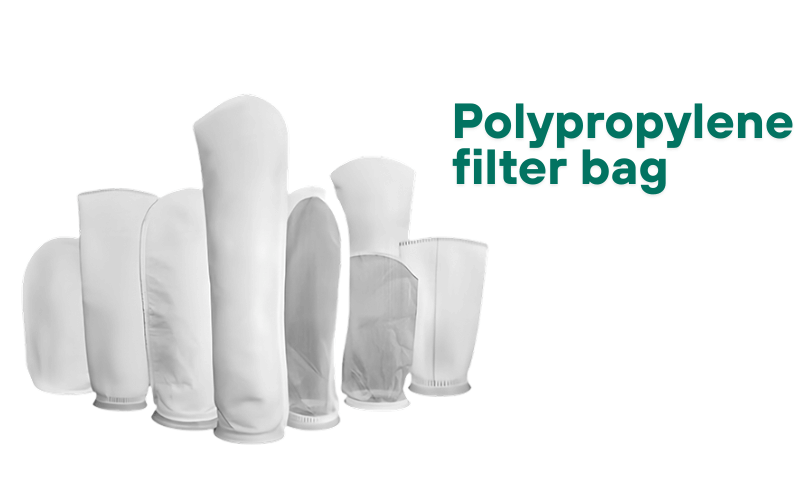
Polypropylene (PP) filter bags are a trusted solution for industries like water treatment, food & beverage, and pharmaceuticals, where precision filtration is critical. Crafted from 100% pure polypropylene and meeting FDA food-grade standards, these filter bags ensure safe, reliable, and efficient filtration for sensitive applications.
Why Choose Polypropylene Filter Bags?
Polypropylene filter bags are renowned for their exceptional chemical resistance, making them compatible with a wide range of fluids, including:
- Acids and alkalis
- Organic solvents
- Oils and fuels
With high flow rates (20–40 m³/h), they deliver efficient filtration without compromising performance.
Key Benefits of Polypropylene Filter Bags
- Superior Chemical Stability: Resistant to most acids, alkalis, and solvents, ensuring durability in harsh environments.
- Hydrophobic Properties: Non-absorbent and ideal for high-humidity conditions (>10% RH).
- Ultra-High Purity: Made from 100% pure polypropylene with no silicone additives, supporting eco-friendly recycling and preventing contamination.
- Consistent Filtration Efficiency: Heat-sealed seams provide excellent sealing and achieve a filtration efficiency of greater than 99.9%.
- Food-Grade Safety: FDA-compliant and non-toxic, making them perfect for food, beverage, and potable water filtration.
Limitations of Polypropylene Filter Bags
While polypropylene filter bags offer numerous advantages, they do have some limitations:
- Temperature Sensitivity: The maximum operating temperature is 107°C (225°F), which limits its use in high-heat applications.
- Chemical Resistance Gaps: Not suitable for potent oxidizing agents like concentrated nitric acid.
- Lower Wear Resistance: Prone to wear when filtering abrasive or sharp particles.
- Challenges with Dyes: May struggle with highly pigmented or concentrated dyes.
Final Thoughts: Are Polypropylene Filter Bags Right for You?
Polypropylene filter bags are a cost-effective and high-performance choice for industries that require chemical resistance, food-grade safety, and high flow rates. While they may not be ideal for extreme conditions, their versatility and efficiency make them a top pick for water treatment, food processing, and chemical filtration.
For more demanding environments, consider alternatives like nylon or PTFE filter bags. However, for standard applications, polypropylene filter bags deliver unmatched value and reliability.
2. Polyester Filter Bags
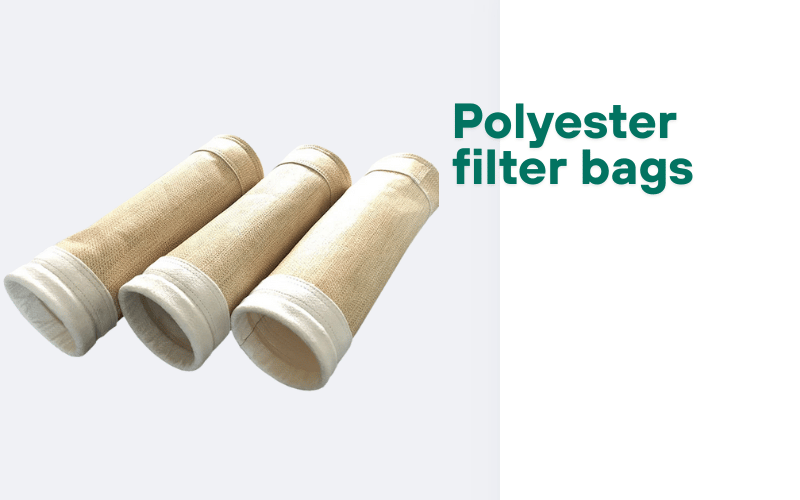
When it comes to high-strength, durable, and precise filtration, polyester (PET) filter bags are a top choice for industries like chemical processing, pharmaceuticals, and wastewater treatment. Constructed from high-tenacity polyester fibers, these filter bags deliver exceptional mechanical stability and abrasion resistance, making them ideal for demanding filtration tasks.
Why Choose Polyester Filter Bags?
Polyester filter bags are engineered for superior tensile strength, allowing them to handle higher pressure differentials compared to polypropylene bags. They excel in filtering:
- Fine particulate matter
- Oily and viscous liquids
- High-temperature fluids (up to 150°C / 302°F)
With low moisture absorption, they maintain stable performance even in humid or wet environments.
Key Benefits of Polyester Filter Bags
- Exceptional Mechanical Strength: Withstands high-pressure conditions and resists tearing, making them perfect for heavy-duty applications.
- High-Temperature Resistance: Operates continuously at temperatures up to 150°C (302°F), outperforming polypropylene in heat-intensive processes.
- Fine Filtration Efficiency: Captures particles as small as 1 micron, ensuring ultra-clean filtrate for critical applications.
- Chemical & Hydrolysis Resistance: Resistant to weak acids, alkalis, and most organic solvents, though not suitable for strong acids or oxidizing agents.
- Low Moisture Absorption: Unlike nylon, polyester does not swell in water, ensuring consistent flow rates in wet conditions.
- Cost-Effective Durability: High abrasion resistance extends service life, reducing replacement frequency and overall costs.
Limitations of Polyester Filter Bags
While polyester filter bags offer numerous advantages, they do have some limitations:
- Limited Resistance to Strong Acids/Alkalines: Not suitable for hydrochloric acid, sulfuric acid, or strong alkaline solutions. For these, consider PTFE or PPS filter bags.
- Not Ideal for High-Oxidizing Environments: Prolonged exposure to bleach or hydrogen peroxide can degrade the fibers.
- Higher Initial Cost: Polyester bags are more expensive upfront than polypropylene alternatives, though their durability often offsets this over time.
Best Applications for Polyester Filter Bags
Polyester filter bags are versatile and excel in a variety of applications, including:
- Chemical & Petrochemical Processing: Filtration of oils, solvents, and coolants.
- Pharmaceutical & Food Industries: Sterile filtration where fine particle retention is critical.
- Wastewater Treatment: Removal of fine sediments and sludge dewatering.
- High-Temperature Liquids: Filtration of hot water, steam condensate, and thermal oils.
3. Nylon Filter Bags
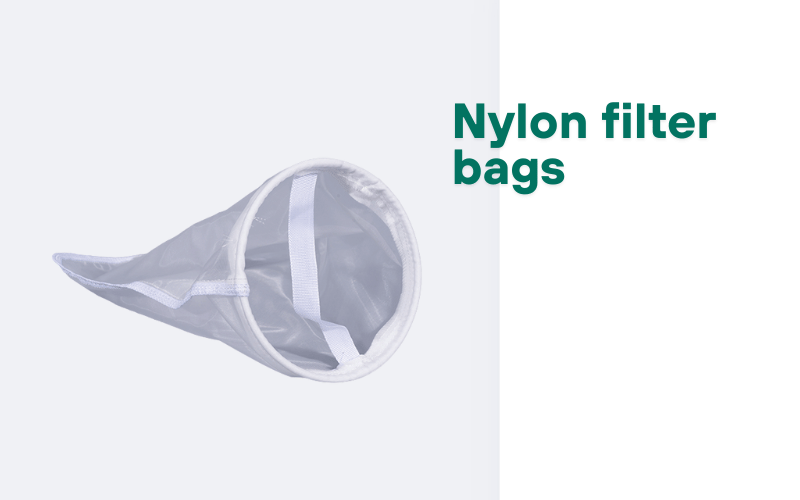
Nylon filter bags are the go-to solution for industries like pharmaceuticals, automotive, and electronics manufacturing, where chemical resistance, flexibility, and fine filtration are critical. Crafted from high-performance polyamide fibers, these filter bags excel in demanding applications that require durability and precision.
Key Benefits of Nylon Filter Bags
- Exceptional Chemical Resistance: Nylon resists hydrocarbons, alcohols, and weak acids, making it ideal for filtering fuels, oils, and solvents.
- High Tensile Strength & Flexibility: Withstands high-pressure pulsations without tearing, ensuring long-lasting performance.
- Fine Particle Retention: Captures particles as small as 1–5 microns, delivering ultra-clean filtrate for sensitive processes.
- Good Temperature Tolerance: Performs effectively in continuous temperatures up to 120°C (248°F).
- Low Fiber Release: Minimizes contamination risks in sterile environments like pharmaceuticals and food processing.
Common Applications of Nylon Filter Bags
Nylon filter bags are versatile and widely used in various industries, including:
- Oil & Fuel Filtration: Removes particulates from lubricants, hydraulic fluids, and diesel.
- Pharmaceutical & Biotech: Sterile filtration of APIs, solvents, and process liquids.
- Electroplating & Surface Treatment: Filters acids and alkaline solutions in metal finishing processes.
- Paint & Coatings Industry: Ensures smooth, debris-free finishes by removing impurities.
Limitations of Nylon Filter Bags
While nylon filter bags offer exceptional performance, there are some limitations to consider:
- Hydrolysis Risk in Hot Water: Prolonged exposure to water above 80°C (176°F) can degrade nylon fibers.
- Not Suitable for Strong Acids or Oxidizers: Avoid use with concentrated sulfuric/nitric acids or chlorine-based solutions.
- Higher Cost: Nylon filter bags are more expensive upfront compared to polypropylene (PP) or polyester (PET) alternatives.
Tips for Optimizing Nylon Filter Bag Performance
- For hot alkaline solutions, opt for nylon 6,6 for enhanced resistance.
- In high-purity applications, choose melt-blown nylon for superior particle capture.
- Use multi-layer housings when filtering high-viscosity fluids to prevent premature clogging.
Nylon filter bags strike the perfect balance between strength, chemical compatibility, and fine filtration. While they may not be suitable for every application, their unique properties make them indispensable for critical industrial processes requiring precision and reliability.
4. PTFE Filter Bags
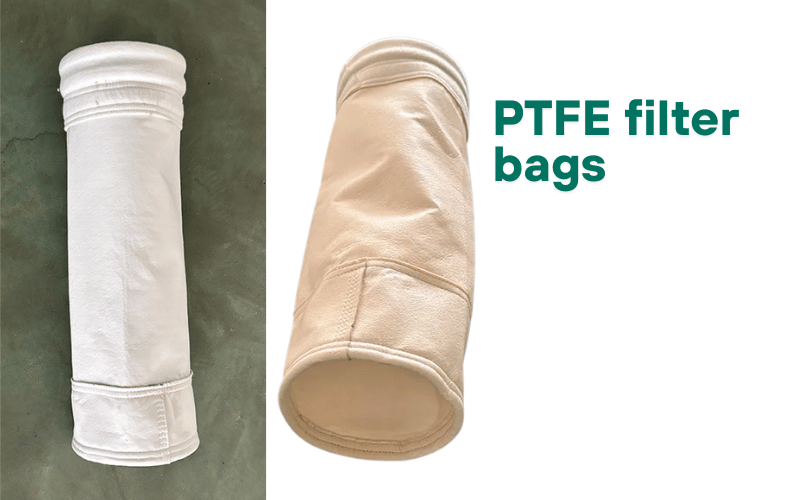
When it comes to maximum chemical resistance, thermal stability, and ultra-fine filtration, PTFE (Polytetrafluoroethylene) filter bags are the gold standard. Designed for industries like chemical processing, pharmaceuticals, and semiconductor manufacturing, these filter bags excel in the most aggressive and demanding environments, outperforming traditional materials in durability and performance.
Why PTFE Filter Bags Stand Out
-
Unmatched Chemical Resistance
PTFE is virtually inert, making it resistant to:- Strong acids: Hydrofluoric, sulfuric, nitric
- Caustic alkalis: Sodium hydroxide, potassium hydroxide
- Organic solvents: Acetone, toluene, DMSO
- Oxidizing agents: Hydrogen peroxide, chlorine
Unlike nylon or polyester, PTFE maintains stability even in highly corrosive media.
-
Exceptional Temperature Tolerance
- Continuous use: -100°C to 260°C (-148°F to 500°F)
- Short-term peaks: Up to 300°C (572°F)
Ideal for steam filtration, hot oils, and high-temperature gas streams.
-
Non-Stick & Hydrophobic Properties
- Clog-Resistant: Particles don’t adhere, extending bag life.
- Self-Cleaning Effect: Reduces maintenance frequency.
- Water-Repellent: Performs flawlessly in humid or wet conditions.
-
Ultra-Fine Filtration Efficiency
- Standard ratings: 1–50 microns
- High-efficiency options: Down to 0.1 microns (membrane PTFE), critical for semiconductor, pharmaceutical, and nanofiltration applications.
Key Applications of PTFE Filter Bags
| Industry | Use Case |
|---|---|
| Chemical Processing | Filtration of aggressive acids, alkalis, and solvents. |
| Pharmaceuticals | Sterile filtration of APIs, solvents, and high-purity liquids. |
| Semiconductor | Ultra-pure water and chemical filtration in chip manufacturing. |
| Power Plants | Hot gas filtration (for flue gas and boiler feedwater). |
| Food & Beverage | High-temperature liquid filtration (oils, syrups, brines). |
Limitations of PTFE Filter Bags
While PTFE filter bags offer unparalleled performance, there are a few considerations:
- Higher Cost: PTFE is more expensive than polypropylene (PP), polyester (PET), or nylon, but its durability justifies the investment for extreme conditions.
- Lower Abrasion Resistance: Not ideal for sharp or jagged particles; consider pairing with a pre-filter for abrasive media.
- Stiffness: Less flexible than nylon or polyester, requiring precise housing fitment.
PTFE Filter Bag Variants
- Membrane PTFE: For sub-micron filtration (0.1–1 micron), ideal for critical gas and liquid purification.
- Felted PTFE: Offers higher dirt-holding capacity, perfect for high-particulate chemical streams.
- Composite PTFE: Reinforced with polypropylene or polyester scrim for added strength.
Best Practices for PTFE Filter Bags
- Pre-Filtration: Use a depth filter to remove large debris and extend the life of PTFE bags.
- Proper Housing: Ensure compatibility with high-temperature and corrosion-resistant housings.
- Cleaning & Reuse: Many PTFE bags can be backflushed or chemically cleaned for extended use.
Final Verdict: Is PTFE Right for You?
PTFE filter bags are the ultimate choice for extreme filtration challenges, offering unmatched chemical resistance, thermal stability, and ultra-fine filtration. While their higher cost may be a consideration, their longevity and performance make them indispensable for:
- Harsh chemical environments
- High-temperature processes
- Critical purity applications
For industries where failure is not an option, PTFE filter bags deliver unparalleled reliability and efficiency, making them the premium solution for demanding filtration needs.
5. Cotton & Natural Fiber Filter Bags
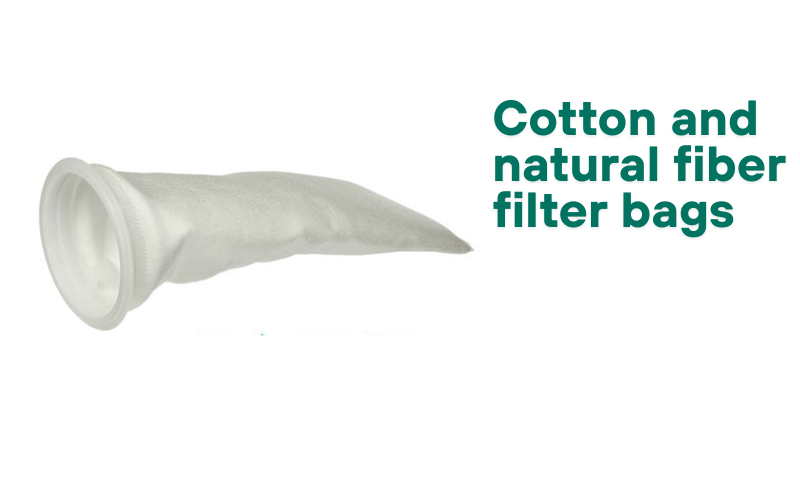
For industries prioritizing eco-friendliness, biodegradability, and cost-effective filtration, cotton and natural fiber filter bags are a reliable and sustainable choice. Crafted from organic materials like cotton, wool, or cellulose fibers, these filter bags strike the perfect balance between filtration efficiency and environmental responsibility.
Key Benefits of Natural Fiber Filter Bags
- Biodegradable & Eco-Friendly: Made from renewable materials, these bags reduce environmental impact compared to synthetic alternatives.
- Excellent Absorption Capacity: Naturally hydrophilic fibers make them ideal for filtering oily or viscous liquids.
- Gentle on Sensitive Media: Perfect for food, beverages, and pharmaceuticals where synthetic contamination is a concern.
- Thermal Resistance: Withstands temperatures up to 100°C (212°F), making them suitable for hot water and steam filtration.
- Cost-Effective: More affordable than synthetic filter bags for low to medium-duty applications.
Common Applications of Cotton & Natural Fiber Filter Bags
Natural fiber filter bags are widely used in industries that value sustainability and gentle filtration, including:
- Food & Beverage: Filtration of edible oils, syrups, beer, and wine.
- Pharmaceuticals: Clarification of herbal extracts, tinctures, and biopharmaceuticals.
- Wastewater Treatment: Removal of organic solids and sludge in eco-conscious facilities.
- Textile & Dyeing: Filtering natural dyes and finishing agents without chemical interference.
Limitations of Natural Fiber Filter Bags
While natural fiber filter bags offer many advantages, they do have some limitations:
- Limited Chemical Resistance: Not suitable for strong acids, alkalis, or aggressive solvents.
- Lower Durability: Prone to faster wear and tear compared to synthetic fibers like polyester or nylon.
- Moisture Sensitivity: Prolonged exposure to wet conditions can cause swelling or degradation.
- Temperature Constraints: Maximum operating temperature (~100°C) is lower than synthetic alternatives.
Types of Natural Fiber Filter Bags
- Cotton Filter Bags: Ideal for food-grade and potable water filtration due to their purity.
- Wool Felt Bags: Offer higher dirt-holding capacity, making them suitable for oily or adhesive liquids.
- Cellulose Fiber Bags: Commonly used in pharmaceutical and bio-processing applications for gentle filtration.
Best Practices for Using Natural Fiber Filter Bags
- Pre-Rinse Before Use: Removes loose fibers and prevents initial contamination.
- Avoid Harsh Chemicals: Use only in mild pH environments (recommended pH range: 4–9).
- Monitor for Wear: Replace more frequently than synthetic bags in high-particulate streams.
Final Verdict: Are Natural Fiber Filter Bags Right for You?
Cotton and natural fiber filter bags are the ideal choice for sustainable, food-safe, and cost-efficient filtration in mild to moderate conditions. While they lack the chemical and thermal resilience of synthetic materials, their biodegradability and gentle filtration make them indispensable for:
- Organic Food & Beverage Production
- Eco-Friendly Wastewater Systems
- Pharmaceutical Applications Requiring Natural Material Compliance
For industries that prioritize green solutions without extreme performance demands, natural fiber filter bags provide effective, environmentally friendly filtration that aligns with sustainability goals.
6. Nomex® Filter Bags

When extreme heat resistance, fire safety, and durability are essential, Nomex® filter bags stand out as the premier choice for industries like cement production, metalworking, and incineration. Crafted from meta-aramid synthetic fibers, these filter bags excel in environments where conventional materials fall short.
Key Benefits of Nomex® Filter Bags
- Exceptional Heat Resistance: Operates continuously at temperatures up to 200°C (392°F) and withstands short-term peaks of 240°C (464°F).
- Flame Retardant & Self-Extinguishing: Complies with NFPA 701 standards, making it ideal for spark-prone environments.
- Superior Mechanical Strength: Resists abrasion and maintains structural integrity under high-pressure differentials.
- Chemical Resistance: Handles weak acids, alkalis, and organic solvents better than natural fibers.
- Long Service Life: Withstands thermal cycling without degradation, reducing the need for frequent replacements.
Primary Applications of Nomex® Filter Bags
Nomex® filter bags are indispensable in industries requiring high-temperature filtration, including:
- Cement & Lime Kilns: Efficiently filters hot gases and kiln dust.
- Metal Smelting & Foundries: Captures fine metal oxides and fumes.
- Waste Incineration: Safely filters fly ash and combustion byproducts.
- Power Generation: Handles hot flue gases in coal-fired plants.
- Chemical Processing: Ideal for drying and calcination processes.
Limitations of Nomex® Filter Bags
While Nomex® filter bags offer exceptional performance, there are a few limitations to consider:
- Hydrolysis Risk in Humid Heat: Prolonged exposure to moisture levels above 10% at temperatures over 120°C can reduce lifespan.
- Not Suitable for Strong Acids or Oxidizers: Avoid use with concentrated sulfuric or nitric acids.
- Higher Initial Cost: Premium performance comes with a higher upfront investment compared to standard synthetic materials.
Tips for Optimizing Nomex® Filter Bag Performance
- Pre-Coating: Apply lime or ash in cement plants to prevent blinding.
- Dew Point Management: Maintain gas dew points at least 10°C above to minimize hydrolysis damage.
- Pulse-Jet Cleaning: Use pulse-jet systems for efficient dust release and extended bag life.
Final Verdict: Is Nomex® Right for Your Application?
Nomex® filter bags are the gold standard for high-temperature gas filtration, offering unmatched thermal stability, flame resistance, and durability. While they require proper operating conditions, their reliability and safety make them indispensable for:
- Hot Gas Filtration
- Spark/Explosion-Prone Environments
- Heavy Industrial Dust Collection
For extreme heat applications where failure is not an option, Nomex® filter bags deliver long-term, dependable performance, making them a trusted solution for the most demanding industrial processes.
7. Fiberglass Filter Bags
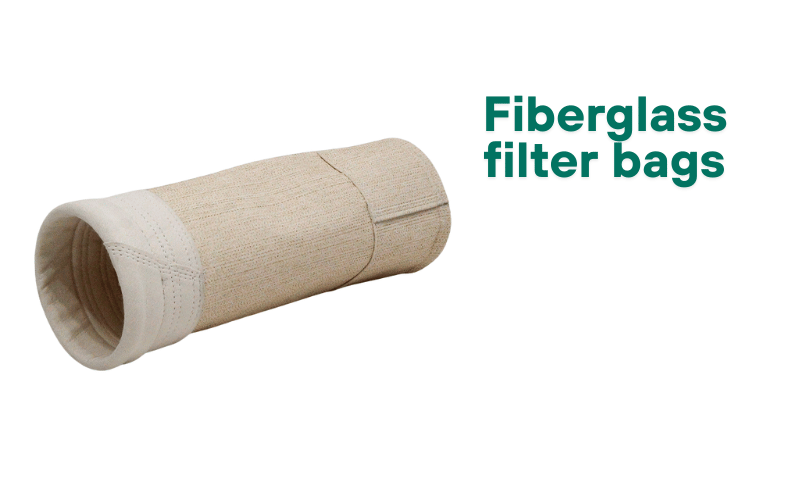
Fiberglass Filter Bags
When it comes to filtration in extreme heat environments, fiberglass filter bags are a top-tier choice. Engineered from high-quality fiberglass fibers, these filter bags are designed to withstand intense temperatures while maintaining dimensional stability and reliable performance. Their unique properties make them indispensable for demanding industrial applications.
Key Benefits of Fiberglass Filter Bags
- Exceptional Heat Resistance: Withstands temperatures up to 500°F (260°C), making them ideal for extreme thermal environments.
- Dimensional Stability: Maintains shape and filtration efficiency even under prolonged exposure to high heat and mechanical stress.
- Effective Filtration Efficiency: Captures fine particulates, ensuring compliance with environmental regulations in industrial processes.
- Durable in Harsh Conditions: Robust construction allows reliable performance in abrasive and high-temperature environments.
Limitations of Fiberglass Filter Bags
While fiberglass filter bags excel in high-temperature applications, there are some drawbacks to consider:
- Brittle and Less Flexible: Fiberglass is inherently brittle, making the bags more prone to damage during handling or installation.
- Limited Chemical Resistance: Not suitable for environments with strong acids or alkalis.
- Higher Maintenance Requirements: Requires careful handling and regular maintenance due to its brittleness.
Common Applications of Fiberglass Filter Bags
Fiberglass filter bags are widely used in high-temperature filtration systems across various industries, including:
- Power Plants: Captures fine particulates and manages emissions in coal-fired and gas-fired plants.
- Waste Incineration: Filters fly ash and combustion byproducts in incinerators.
- Cement Manufacturing: Handles kiln dust and hot gases in cement production.
Their ability to maintain efficiency under harsh conditions makes fiberglass filter bags a trusted solution for industrial processes requiring consistent performance in extreme heat.
Technical Specifications
| Parameter | Typical Value |
|---|---|
| Fiber Diameter | 5-9 microns |
| Filtration Efficiency | 99.9% @ 1 micron |
| Air-to-Cloth Ratio | 1.5:1 to 2.5:1 |
| Recommended Airflow | 2-4 cm/s face velocity |
Specialized Variants of Fiberglass Filter Bags
- PTFE-Laminated Fiberglass: Offers enhanced chemical resistance and improved cake release.
- Silicon-Impregnated Fiberglass: Increases flexibility and abrasion resistance.
- Graphite-Treated Fiberglass: Provides superior lubricity and reduces friction wear.
Final Verdict: Why Choose Fiberglass Filter Bags?
Fiberglass filter bags are the premier choice for dry, high-temperature gas filtration, offering unmatched thermal performance and long-term stability. While they require proper system design and maintenance, their durability and cost-effectiveness make them indispensable for:
- Continuous High-Heat Processes
- Corrosive Gas Stream Filtration
- Applications Requiring Dimensional Stability
For industries operating at the upper limits of temperature tolerance, fiberglass filter bags deliver reliable, efficient, and maintenance-friendly filtration performance, making them a cornerstone of high-temperature industrial filtration systems.
8. Stainless Steel Filter Bags

Stainless steel filter bags are the ultimate solution for industries requiring robust, long-lasting filtration. Constructed from precision-woven 304/316L stainless steel mesh, these filter bags outperform plastic alternatives, delivering exceptional durability and reliability in the harshest environments.
Key Performance Features of Stainless Steel Filter Bags
- Extreme Temperature Resistance: Operates continuously at temperatures up to 480°C (900°F).
- Exceptional Corrosion Resistance: Withstands exposure to acids, alkalis, and solvents without degradation.
- High Filtration Efficiency: Maintains 99.9% filtration efficiency even under challenging conditions.
- Pressure Tolerance: Handles high-pressure differentials up to 0.2MPa with ease.
Advantages of Stainless Steel Filter Bags
- Industrial-Grade Strength: Reinforced metal construction resists deformation and supports repeated backwashing.
- Chemical Inertness: Perfect for aggressive fluids in chemical processing and oil refining.
- Reusable Design: Easily cleaned and sterilized, allowing for multiple use cycles and reducing waste.
- High-Temperature Stability: Performs reliably in extreme heat applications, making it ideal for demanding processes.
Common Applications of Stainless Steel Filter Bags
Stainless steel filter bags are widely used across industries where durability and reusability are critical, including:
- Food & Beverage Processing: Ensures safe and efficient filtration of liquids and ingredients.
- Wastewater Treatment: Handles corrosive and high-temperature effluents.
- Chemical Manufacturing: Filters aggressive chemicals and solvents.
- Petrochemical Refining: Manages high-pressure and high-temperature filtration needs.
- Pharmaceutical Production: Provides sterile, reliable filtration for sensitive applications.
Considerations for Stainless Steel Filter Bags
While stainless steel filter bags offer unmatched durability and performance, there are a few factors to keep in mind:
- Higher Initial Investment: More expensive upfront compared to disposable filters, but cost-effective over time due to reusability.
- Proper Housing Required: Optimal performance depends on compatible filter housing.
- Best for Reusable Applications: Ideal for operations where reusability offsets the initial cost.
Why Choose Stainless Steel Filter Bags?
Stainless steel filter bags are the gold standard for filtration in extreme conditions, offering:
- Long-Term Cost Savings: Reusability reduces the need for frequent replacements.
- Reliable Performance: Ensures consistent filtration in critical processes.
- Reduced Maintenance: Durable construction minimizes downtime and maintenance requirements.
For industries where filter failure is not an option and total cost of ownership is a priority, stainless steel filter bags provide unmatched value, reliability, and performance.
9. Acrylic
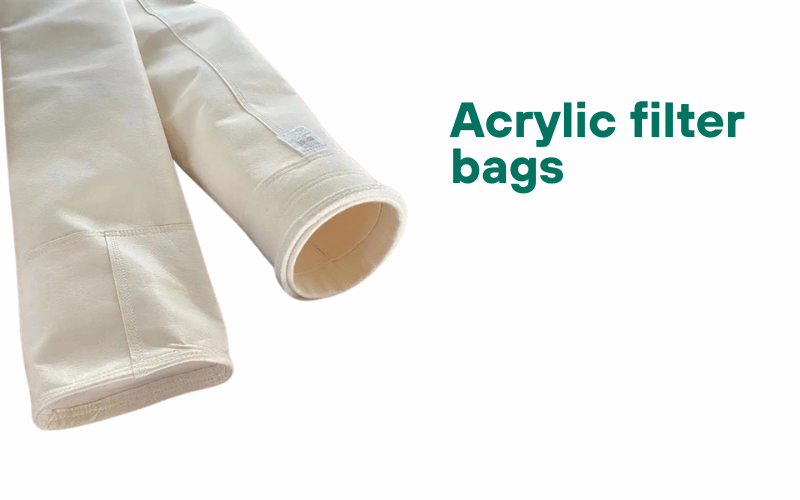
Acrylic filter bags are an excellent choice for operations requiring better performance than standard polyester at an affordable price. Crafted from durable acrylic fibers, these filter bags deliver superior dust collection and consistent performance in a variety of industrial applications.
Key Performance Features of Acrylic Filter Bags
- Temperature Resistance: Maintains stable filtration efficiency in temperatures up to 120°C (250°F).
- Chemical Resistance: Excellent tolerance to most acids and weak alkalis.
- High Filtration Efficiency: Consistently achieves 99%+ dust collection efficiency.
- Humidity Performance: Performs reliably in high-humidity environments where cotton filters fall short.
Benefits of Acrylic Filter Bags
- Superior Dust Collection: Special fiber structure effectively captures fine particles, ensuring cleaner air and compliance with regulations.
- Moisture Resistance: Performs well in damp conditions, making it ideal for humid environments.
- Economic Value: More affordable than premium options like Nomex, while offering better temperature resistance than polyester.
- Chemical Tolerance: Handles common industrial chemicals better than natural fiber alternatives.
Common Applications of Acrylic Filter Bags
Acrylic filter bags are versatile and widely used in industries requiring dependable dust collection, including:
- Coal-Fired Power Plants: Efficiently captures fly ash and fine particulates.
- Cement & Mineral Processing: Handles dust and debris in high-dust environments.
- Grain Handling & Food Processing: Ensures clean air in food production and storage facilities.
- Woodworking & Sawdust Collection: Captures fine wood particles and sawdust effectively.
- Pharmaceutical Powder Processing: Provides reliable filtration for fine powders and dust.
Considerations for Acrylic Filter Bags
While acrylic filter bags offer excellent performance, there are a few limitations to keep in mind:
- Not Suitable for Strong Acids or High Temperatures: Avoid use in extreme chemical or thermal environments.
- Maintenance Required: Regular cleaning cycles are necessary to maintain optimal efficiency.
- Best for Moderate Temperatures: Ideal for operations within the 120°C (250°F) range.
Why Choose Acrylic Filter Bags?
Acrylic filter bags strike the perfect balance between performance and affordability, making them a reliable choice for dust collection in moderate conditions. They offer:
- Better Value: More cost-effective than specialty synthetic filters like Nomex.
- Improved Moisture Resistance: Outperforms standard polyester in damp environments.
- Dependable Performance: Ideal for typical industrial applications requiring effective dust control.
For operations needing reliable, cost-efficient filtration with moderate chemical and temperature requirements, acrylic filter bags deliver consistent results without breaking the budget.
10. Polyethylene

Polyethylene filter bags are a cost-effective and lightweight solution for applications requiring basic filtration performance. Made from high-quality polyethylene fibers, these filter bags are designed to provide reliable results in low-temperature and non-aggressive environments.
Key Features of Polyethylene Filter Bags
- Chemical Resistance: Offers excellent resistance to mild acids, alkalis, and other non-corrosive chemicals.
- Temperature Tolerance: Best suited for low-temperature applications, with a maximum operating temperature of 150°F (65°C).
- Lightweight Design: Easy to handle, install, and replace, reducing labor and maintenance efforts.
Benefits of Polyethylene Filter Bags
- Affordable Filtration: A budget-friendly option for basic filtration needs, ideal for cost-conscious operations.
- Good Chemical Compatibility: Resistant to many mild chemicals, making it suitable for non-corrosive environments.
- Ease of Use: Lightweight and flexible, simplifying installation and replacement.
- Low-Cost Solution: Perfect for applications that don’t require high-temperature or high-pressure resistance, such as water treatment and sediment filtration.
Limitations of Polyethylene Filter Bags
While polyethylene filter bags are practical and economical, there are some limitations to consider:
- Limited Temperature Resistance: Not suitable for high-temperature applications, with a maximum tolerance of 150°F (65°C).
- Lower Durability: Compared to materials like polyester or stainless steel, polyethylene has lower mechanical strength and may wear out faster in demanding environments.
- Not for Aggressive Chemicals: Incompatible with strong acids, alkalis, or solvents, limiting use in highly corrosive settings.
- Single-Use Design: Often intended for single-use applications, which can increase waste and replacement costs over time.
Common Applications of Polyethylene Filter Bags
Polyethylene filter bags are widely used in low-cost filtration systems and are ideal for:
- Water Treatment: Effective for sediment filtration and basic water purification.
- Sediment Filtration: Captures fine particles in non-aggressive environments.
- Light Industrial Processes: Suitable for applications that don’t involve high temperatures or heavy mechanical stress.
Why Choose Polyethylene Filter Bags?
Polyethylene filter bags are a practical and economical choice for basic filtration needs. They offer:
- Cost-Effectiveness: A budget-friendly solution for low-demand applications.
- Ease of Handling: Lightweight and flexible design simplifies installation and maintenance.
- Reliable Performance: Delivers consistent filtration in low-temperature, non-corrosive environments.
For industries prioritizing affordability and simplicity, polyethylene filter bags provide an efficient and reliable option for basic filtration tasks.
Comparison Table of Common Filter Bag Materials
| Material | Temperature Resistance | Chemical Compatibility | Durability | Cost | Best Applications |
|---|---|---|---|---|---|
| Polypropylene | Moderate (up to ~200°F / 93°C) | Excellent resistance to acids, alkalis, and organic solvents | Good | Low | Chemical processing, water treatment, food and beverage filtration |
| Polyester | Moderate (up to ~275°F / 135°C) | Resistant to organic chemicals, but not strong acids or alkalis | High | Moderate | Automotive, cement, general manufacturing, water and oil filtration |
| Nylon (Monofilament) | Moderate (up to ~300°F / 149°C) | Good resistance to many chemicals, but limited against strong acids | Very High (washable/reusable) | High | Paints, inks, coatings, food and beverage, pharmaceuticals, electronics |
| PTFE (Teflon) | Very High (up to ~500°F / 260°C) | Exceptional resistance to almost all chemicals, including strong acids and alkalis | Extremely High | Very High | Flue gas filtration, chemical processing, high-temperature and corrosive environments |
| Cotton/Natural Fibers | Low (up to ~180°F / 82°C) | Limited chemical resistance, suitable for mild or organic contaminants | Moderate | Low | Agriculture, food processing, water filtration, eco-friendly and artisanal applications |
| Nomex (Aramid Fibers) | High (up to ~400°F / 204°C) | Limited resistance to strong acids | High | High | High-temperature industrial processes, such as asphalt and cement production |
| Fiberglass | Very High (up to ~500°F / 260°C) | Moderate chemical resistance, not suitable for strong acids or alkalis | High | High | High-temperature filtration in power plants and incinerators |
| Stainless Steel | Very High (up to ~500°F / 260°C) | Excellent resistance to aggressive chemicals, including strong acids and alkalis | Extremely High | Very High | Chemical processing, oil and gas, food and beverage, and high-pressure or high-temperature systems |
| Acrylic | Moderate (up to ~250°F / 121°C) | Good chemical resistance | Moderate | Moderate | Industrial dust collection and moderate-temperature filtration |
| Polyethylene | Low (up to ~150°F / 65°C) | Resistant to many mild chemicals | Low | Low | Low-cost filtration for water and light industrial applications |
How to Match Filter Bag Material to Your Application
Water Filtration: Best Materials for Sediment and Chemical Removal
When it comes to water filtration, selecting the right filter bag material is crucial for effectively removing sediment and chemicals. For sediment filtration, materials like polypropylene and polyester are commonly used due to their durability and ability to trap fine particles. These materials are resistant to waterborne contaminants and can withstand a wide range of pH levels, making them ideal for municipal water treatment and industrial water recycling applications.
For chemical removal, activated carbon-impregnated filter bags are highly effective. These bags are designed to adsorb impurities such as chlorine, pesticides, and organic compounds, ensuring cleaner and safer water. Nylon monofilament mesh is another excellent option for applications requiring precision filtration, as it offers high tensile strength and can be customized to specific micron ratings.
Oil and Gas: Materials That Withstand High Temperatures and Corrosive Substances
The oil and gas industry demands filter bag materials that can endure extreme conditions, including high temperatures and exposure to corrosive chemicals. Fiberglass filter bags are a top choice for these applications, as they can withstand temperatures up to 500°F (260°C) and resist chemical degradation. These bags are often used in processes like gas filtration and catalyst recovery.
For applications involving corrosive substances, PTFE (polytetrafluoroethylene) filter bags are highly recommended. PTFE is chemically inert and offers excellent resistance to acids, alkalis, and various solvents, making it suitable for use in challenging environments. Additionally, stainless steel mesh filter bags are often employed for their durability and ability to handle abrasive materials without compromising filtration efficiency.
Food and Beverage: FDA-Approved Materials for Safety and Hygiene
In the food and beverage industry, safety and hygiene are paramount, and filter bag materials must comply with FDA regulations. Polypropylene and polyester felt are widely used due to their food-grade certifications and ability to filter out contaminants without leaching harmful substances. These materials are ideal for applications such as juice clarification, beer filtration, and dairy processing.
For more specialized needs, nylon monofilament mesh is often used due to its precision and ease of cleaning. This material is beneficial in applications requiring fine filtration, such as removing sediment from wine or filtering syrups. Silicone-coated filter bags are another option, offering enhanced durability and resistance to high temperatures during processes like pasteurization.
Pharmaceuticals: Materials for Sterile and Precise Filtration
Pharmaceutical applications require filter bag materials that ensure sterility and precision. PTFE and polypropylene are commonly used due to their chemical resistance and ability to maintain integrity under sterilization processes, such as autoclaving. These materials are ideal for filtering active pharmaceutical ingredients (APIs) and ensuring the removal of contaminants without compromising product quality.
For ultra-fine filtration, nylon monofilament mesh and melt-blown polypropylene are excellent choices. These materials can achieve micron ratings as low as 1 micron, making them suitable for applications like serum filtration and vaccine production. Additionally, all materials used in pharmaceutical filtration must meet stringent regulatory standards, such as USP Class VI and FDA compliance, to ensure safety and efficacy.
Industrial Applications: Heavy-Duty Materials for Harsh Environments
Industrial applications often involve harsh environments that demand heavy-duty filter bag materials. Polyester felt is a popular choice due to its durability and ability to withstand abrasive particles, making it suitable for applications such as cement production and metalworking. For high-temperature environments, fiberglass and aramid (Nomex) filter bags are preferred due to their thermal stability and resistance to chemical degradation.
In applications involving corrosive chemicals, PTFE-coated filter bags provide an added layer of protection, ensuring longevity and consistent performance. Stainless steel mesh is another robust option, particularly for applications requiring reusable and washable filter bags. These materials are designed to withstand the rigors of industrial processes while maintaining high filtration efficiency.
Common Mistakes to Avoid When Choosing Filter Bag Materials
Overlooking Operating Conditions
One of the most common errors when selecting filter bag materials is failing to consider the specific operating conditions of the application. Factors such as temperature, pressure, and the type of contaminants being filtered play a critical role in determining the appropriate material. For instance, using a standard polyester filter bag in a high-temperature environment can lead to premature failure, as the material may degrade or lose its structural integrity. Similarly, selecting a material that cannot withstand abrasive particles or corrosive chemicals can result in reduced filtration efficiency and frequent replacements.
To avoid this mistake, it’s essential to evaluate the operating environment thoroughly. Consider the maximum temperature the filter will be exposed to, the chemical composition of the substances being filtered, and the required filtration precision. Materials like PTFE or fiberglass are better suited for extreme conditions, while polypropylene or polyester may suffice for less demanding applications.
Choosing the Cheapest Option Without Considering Durability
Another common pitfall is prioritizing cost over quality when selecting filter bag materials. While opting for the least expensive option may seem cost-effective initially, it often leads to higher long-term expenses due to frequent replacements, system downtime, and potential damage to equipment. For example, a low-cost filter bag made from subpar materials may tear or clog quickly, compromising the filtration process and requiring immediate replacement.
Investing in high-quality materials that match the application’s demands can significantly reduce maintenance costs and improve overall efficiency. Durable options, such as stainless steel mesh or PTFE-coated bags, may have a higher upfront cost but offer extended lifespans and improved performance in challenging environments. Always weigh the initial investment against the long-term benefits to make an informed decision.
Ignoring Compatibility with the Filtration System
Failing to ensure compatibility between the filter bag material and the filtration system is another mistake that can lead to operational inefficiencies. Different filtration systems are designed to work with specific materials and configurations, and using an incompatible filter bag can result in poor sealing, reduced flow rates, or even system failure. For instance, a bag with an incorrect micron rating or size may allow contaminants to bypass the filter, defeating its purpose entirely.
To prevent this issue, consult the manufacturer’s specifications and guidelines for your filtration system. Verify that the chosen material aligns with the system’s design, including factors like bag dimensions, sealing mechanisms, and flow capacity. Additionally, consider the ease of installation and replacement, as a poorly fitting filter bag can lead to increased downtime and labor costs. Ensuring compatibility not only enhances filtration performance but also extends the lifespan of both the filter bag and the system itself.
FAQs About Filter Bag Materials
What Is the Most Durable Material for Filter Bags?
The durability of a filter bag material depends on the specific application and operating conditions. For high-temperature environments, fiberglass and aramid (Nomex) are among the most durable options, as they can withstand extreme heat without degrading. PTFE (polytetrafluoroethylene) is another highly durable material, offering exceptional resistance to chemicals, high temperatures, and wear, making it ideal for demanding industrial applications.
For applications involving abrasive particles, stainless steel mesh is a top choice due to its robust structure and reusability. Polyester and polypropylene are also durable options for general-purpose filtration, offering resistance to a wide range of contaminants and moderate temperatures. Ultimately, the most durable material is one that aligns with the specific demands of your filtration process, including temperature, chemical exposure, and particle size.
How Do I Know If a Material Is Compatible With My System?
Ensuring compatibility between the filter bag material and your filtration system is crucial for optimal performance. Start by reviewing the specifications provided by the system manufacturer, which typically include recommended materials, micron ratings, and bag dimensions. Using a material that matches these specifications will help maintain proper sealing, flow rates, and filtration efficiency.
Additionally, consider the operating conditions of your system, such as temperature, pressure, and the type of contaminants being filtered. For example, if your system handles corrosive chemicals, materials like PTFE or stainless steel mesh are better suited than polyester or polypropylene. Consulting with a filtration expert or supplier can also help you identify the best material for your specific system and application.
Can I Use the Same Material for Different Applications?
While it may be tempting to use a single filter bag material across multiple applications, this approach is not always practical. Different applications have unique requirements, including varying temperatures, chemical exposures, and precise filtration. For instance, a polypropylene filter bag may be suitable for water filtration but may not withstand the high temperatures or corrosive substances commonly found in oil and gas applications.
Using the wrong material can lead to reduced efficiency, shorter lifespan, and potential system damage. It’s essential to evaluate the specific needs of each application and select a material that meets those requirements. In some cases, versatile materials like PTFE or stainless steel mesh can be used across a range of applications, but always confirm their suitability for each specific use case.
Conclusion
Selecting the right filter bag material is essential for ensuring efficient and reliable filtration across various applications. By carefully evaluating your specific needs—such as operating conditions, system compatibility, and durability requirements—you can optimize performance and reduce long-term costs. If you’re unsure about the best material for your application, consulting with experts can provide valuable guidance. Contact us today for expert advice on selecting the ideal filter bag material for your specific needs.


